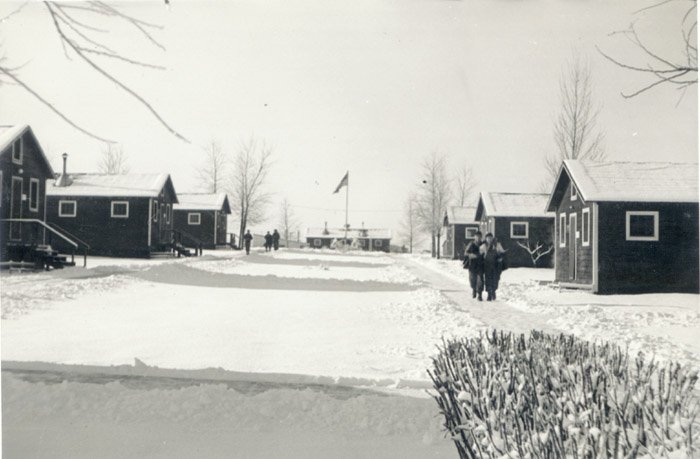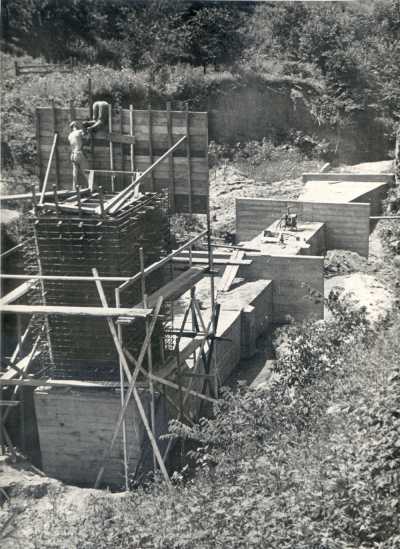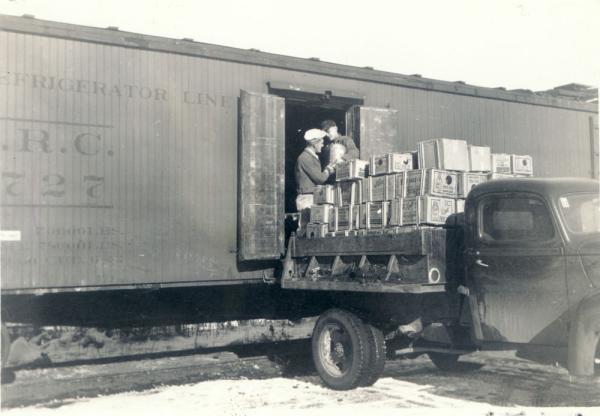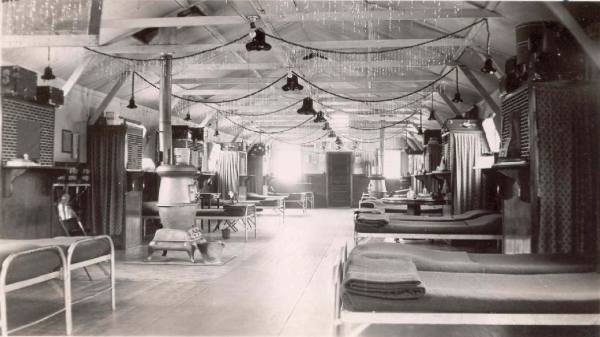Civilian Public Service Camp 18
Denison, Iowa
Camp 18, Denison, Iowa was opened August 1941 and closed August 1946.
Establishment of the Civilian Public Service
Civilian Public Service originated in the Selective Service and Training Act of 1940 and provided concientious objectors options of noncombatant roles in the military or work of national importance in places under civilian control.
The CPS camps were set up and run by the Mennonites, Friends, and Brethren churches, using old Civilian Conservation Corps (CCC) camps. The government did not make the agencies pay for the use of the land, however, the agencies did have to pay for everything else in the camp including, food, clothing, electricity, and tools.
The work done at the CPS camps benefited forestry, soil conservation, national parks, mental hospitals, and land reclamation bureaus of the federal government.
Establishment of the Denison CPS Camp
Denison Camp 18 - August 28, 1941 - The Crawford County Board of Supervisors on August 20 had resolved that no objections were issued to the Selective Service for the occupation by conscientious objectors of the camp site near Denison. This camp was located on the Lincoln Highway U.S. 30, about one mile southwest of Denison.
In August of 1941, one hundred and ten young men from several surrounding states who have been classified as 4-E (Conscientious Objectors) in the National selective service files, started to arrive at the Denison camp, and the number increased to 150 by the middle of September. The Denison camp was to be engaged in soil conservation work. The camp capacity was about 180 to 200 persons.
All necessary food and incidental items would be purchased in Denison and paid for with cash. The men of the camp did not wear any uniforms, only customary clothing usually worn by boys as they work on their home farms
Men in the camp worked under the direction of the soil conservation service in the Denison area, doing contour plowing, fence relocation, planting, ditching and other work. Field work was under technical supervision, while housing, feeding, clothing, medical care, was furnished by the individual and the church which is responsible for the camp.
The Mennonite church organizations meet the basic expenses for maintaining the camp, which was $35 dollars for man per month. The federal government supplied the camp and heavy soil work equipment.
Gideon Yoder a representative of the Mennonite church, served as the camp director. Albert Foote was the assistant director and Alta Schrock served as Matron, Katie Yoder was the dietitian and Willard Baer the business manager, all who were paid for by the church organizations.
The camp consisted of seven dormitories, a dining hall, a staff cottage, bath house, chapel, a combination laundry-drying and storage building, a shop, a hospital and an office building.
At first there was considerable antagonism, which came to a crisis in 1942, when it was made known that the COs were not welcome in town. The feeling subsided gradually when the farmers found in the COs a satisfactory answer to their labor problems. The wives of the COs who found employment in the homes of the city also helped build good community relations.
Denison Camp Activities
The largest project on hand was the construction of a concrete flume started by CCC members and taken over by the CPS camp members. Three other crews were located on farms near Denison to rearrange fences to allow for contour farming.
In 1942, an average of 40 or more men per day left the Denison CPS camp to help the farmers in haying and harvesting. The cost to the farmer was $4 per day, plus two meals and transportation. The money was then turned over to the government.
During the spring of 1943, 150,000 trees were planted on 48 farms in Crawford County. Emergency farm work was important in the work of the camp. By the end of July, 1943, almost 100 farmers had applied for farm help from the CPS camp. From 1941 to 1946, more than 11,000 man days of emergency farm labor was provided by the camp in Denison.
In 1943, ten track-type tractors had been assigned to Denison. Two were used on graders for the construction of terraces; four were equipped with bulldozers for sloping bank, constructing water ways, and clearing the base of earth fills. The other four were equipped with four-yard carry-all scrapers for constructing earth fills.
Because the Denison area was a silt loam of light texture, within a short time, a small ditch of a few inches became a gully of many feet. Concrete dams were constructed to check deepening gullies.
Camp 18, building the concrete dams for soil erosion.
In April, May and June of 1943, a heavy spring thaw and heavy rains caused flooding of over a million and half acres of farmland by the Missouri River. During April 1943, seven trucks loaded with men and equipment from Camp 18 in Denison helped build sandbag levees to control the flooding Missouri River.
In 1943 a food collecting center was set up in Denison for Midwest CPS camps. By the end of 1943 Mennonite communities in the Middle West had sent to Denison seventy thousand quarts of canned fruits and vegetables where they were loaded on refrigerated railroad cars and sent to the camps between the Mississippi and the Rocky Mountains.
Loading refrigerator railroad cars with canned goods at CPS camp #18
The Iowa board of control in 1943 announced a plan to have 25 men from the Denison CPS camp serve as a trial unit to work as attendants in Iowa mental hospitals. The men were used to relieve a shortage of attendants.
In 1942 at Christmas, the men in the camp prepared seventeen boxes of food and distributed them among needy families in Denison. The following year eleven boxes were distributed among the needy families.
One of the dormitories decorated for Christmas
In 1944, a relief training school was opened at Denison. Those interested in entering relief work were given the opportunity to transfer to Camp 18. The program got under way in June and continued on until the relief unit was transferred to Poughkeepsie, New York the following spring.
Closing of the Denison CPS Camp
By July 12, 1946, the local American Legion was notified by the selective service that the CPS camp was to be abandoned and the buildings on the property may become available for housing purposes. By August of 1946 all members of the CPS camp had left.
By September the city acquired the CPS camp buildings located in southwest Denison including the dining hall and kitchen, the hospital quarters, the foremen's quarters, the office building and barracks and the bath and laundry building. The county got one repair shop and shed. Three of the units had been earmarked for later use by the county 4-H clubs.
Credits and Sources:
Denison Review and Denison Bulletin;
Mennonite Church; Service for Peace, A History of Mennonite Civilian Public Service, by Melvin Gingerich
Photo Collection, Courtesy of the Following:
Mennonite Library and Archives; Mennonite Church USA Archives, North Newton, Kansas; MC USA Archives, Goshen, Indiana
Material for article and photos submitted by Phyllis Heller






